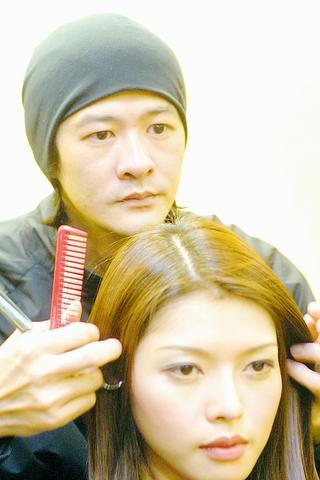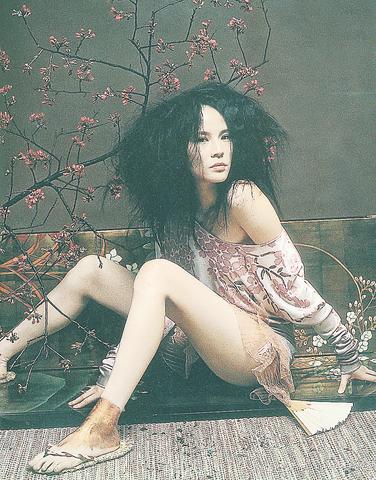It's good to be Andy Wong (
Andy, as he is known by most every starlet and pop diva in the Chinese-speaking world, is a hairdresser. Specifically, he is the creative director of Eros 04, Taiwan's highest-profile and most expensive salon, where he holds court with a retinue of chic, curiously-coifed young things who look up to their boss as if he were some mythic being.

PHOTO: SEAN CHAO, TAIPEI TIMES
"Andy will see you now," whispers a girl whose frozen hair looks as if she's standing with her back to a strong wind. Eros has a cool green color scheme, down to the polished cement floor. It's Spartan save for the cozily cushioned chairs and the mirrors that reflect famous faces.

PHOTO COURTESY OF L'OREAL
Clients sneak surreptitious glances at one another, trying to look sexy while draped in a plastic smock with tin foil in their hair. There is the slightly rancid scent of a perm in the air.
Andy's voice and handshake are both warm and strong. He exudes the confidence you'd expect of a person at the top of his game. He has designed for photo spreads in Vogue, Elle, Marie Claire and others. He jets between his salon in Taipei and another, Orient 04, in his native Hong Kong.

PHOTO COURTESY OF MARIE CLAIRE
His client list reads like the guest list of a Golden Horse or Golden Melody awards. He is surrounded by beautiful, wealthy and powerful people that come to him in supplication, pay him handsomely and heap praise on him. He has an assistant named Monkey.

PHOTO COURTESY OF MARIE CLAIRE
"Get us a cup of tea, Monkey," he says, and off Monkey scoots. He stares straight ahead while he speaks as if reading cue cards, though his answers sound
anything but rehearsed.
"Beauty is a person's ability to realize their most special characteristics and bring them to the surface," he says. "I only help them realize it, the clients do the real work."
The clients he's speaking of are the film and music personalities looked up to by a billion Chinese youth; Faith Yang (
"They're clients, yes, but I consider them to be friends first."
They're friends, he explains, because they come to him with split ends and ended relationships and he's able to mend both. "There is an amount of psychology to what I do. A new styling can be the same as a new mental perspective, or a new lease on life."
How much will a new lease on life set you back? A straightforward cut is NT$3,600; perming or dyeing can cost upwards of NT$5,000. It is, according to Sarah Chen (
Without a doubt, Andy is the most sought-after hairdresser, not just for individual clients, but for film and video production as well. By rough estimates, he makes upward of US$500,000 a year, which is an improvement over the HK$500 (NT$2,200) per month he made when he first began cutting hair 20 years ago.
But for all the success he's enjoyed in the salon, he is equally talented with a camera in hand as he is a pair scissors and comb. An exhibition of his photos, taken on a recent visit to Xianjiang, is currently on display on the fourth floor of the Asia World Department Store.
The 40-year-old has also chronicled his life in a new book, Andy in Eros (玩美), released by Crown Publishing. A limited amount of free copies are available to visitors of his
exhibition.
If Andy's definition of beauty is to bring that which is most special in person to the surface, then he is surely himself a beautiful person. His own special characteristic is to make people feel good about themselves and leave his salon in a lighter mood, albeit with a lighter pocketbook. None of them seem to mind.
"I love Andy," said one freshly coiffed beauty stepping lightly out of Eros.
Yes, it's definitely good to be Andy.

On April 26, The Lancet published a letter from two doctors at Taichung-based China Medical University Hospital (CMUH) warning that “Taiwan’s Health Care System is on the Brink of Collapse.” The authors said that “Years of policy inaction and mismanagement of resources have led to the National Health Insurance system operating under unsustainable conditions.” The pushback was immediate. Errors in the paper were quickly identified and publicized, to discredit the authors (the hospital apologized). CNA reported that CMUH said the letter described Taiwan in 2021 as having 62 nurses per 10,000 people, when the correct number was 78 nurses per 10,000

As we live longer, our risk of cognitive impairment is increasing. How can we delay the onset of symptoms? Do we have to give up every indulgence or can small changes make a difference? We asked neurologists for tips on how to keep our brains healthy for life. TAKE CARE OF YOUR HEALTH “All of the sensible things that apply to bodily health apply to brain health,” says Suzanne O’Sullivan, a consultant in neurology at the National Hospital for Neurology and Neurosurgery in London, and the author of The Age of Diagnosis. “When you’re 20, you can get away with absolute

May 5 to May 11 What started out as friction between Taiwanese students at Taichung First High School and a Japanese head cook escalated dramatically over the first two weeks of May 1927. It began on April 30 when the cook’s wife knew that lotus starch used in that night’s dinner had rat feces in it, but failed to inform staff until the meal was already prepared. The students believed that her silence was intentional, and filed a complaint. The school’s Japanese administrators sided with the cook’s family, dismissing the students as troublemakers and clamping down on their freedoms — with

As Donald Trump’s executive order in March led to the shuttering of Voice of America (VOA) — the global broadcaster whose roots date back to the fight against Nazi propaganda — he quickly attracted support from figures not used to aligning themselves with any US administration. Trump had ordered the US Agency for Global Media, the federal agency that funds VOA and other groups promoting independent journalism overseas, to be “eliminated to the maximum extent consistent with applicable law.” The decision suddenly halted programming in 49 languages to more than 425 million people. In Moscow, Margarita Simonyan, the hardline editor-in-chief of the